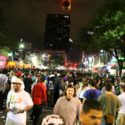Talk about bad timing.
A few hours after news spread across social media and local news outlets that shootings in Austin’s Sixth Street downtown entertainment district had left one person dead and three others injured, on another corner of the Internet, the financial news site Forbes published a story calling for the city to “unleash” Sixth Street and let bars stay open until 4 a.m.
Not only was his timing off. Forbes writer Scott Beyer actually advocated for patrons of the closed-to-traffic entertainment district being allowed to carry their drinks outside of bars, and drink in the streets, to create an “anything goes” atmosphere that would generate more revenue for business, similar to allowances made in New Orleans’ famous Bourbon Street party district. Never mind the public health and safety nightmares such actions would cause.
Let’s toss out any connection one might want to draw between the early morning shootings and the laundry list of problems that plague “Dirty Sixth” pretty much every weekend. Fatal violence is not an epidemic in Austin, and on the whole the city is remarkably safe for its size and population, especially when we are compared to other large cities in Texas.
But the notion that the downtown entertainment district is in any way inhibited, or that a 2 a.m. closing time takes away from the city’s cultural vitality, is laughable. Dirty Sixth on the weekends approaches Mos Eisley cantina levels of outrageous behavior, with entire blocks of high-volume shot bars having mostly crowded out music-first clubs in a race to move as much booze as possible. We even have a popular Facebook group called 6th Street Fails that should only be viewed by individuals who appreciate watching others in the throes of depravity and drunkenness.
Besides, Dirty Sixth bars feature prominently in the rankings for monthly liquor sales in the Austin area – especially when you calculate for sales per square footage involved. So, it’s not like the district is suffering in an economic sense.
However, two more hours of prime drinking time would cause rents in the district to climb even higher than they already are, in short order too. The opportunity for would be bar owners to make more money will increase demand to get in on a fixed number of properties.
As a result, drink prices will go up as even more pressure is put on business owners to keep their revenue climbing, which is going to further erode downtown’s live music scene. Oddly enough, that is a facet of Dirty Sixth that Beyer claims he wants to protect, but for someone who trumpets the glory of the free market he’s pretty terrible at gaming out the cause-and-effect relationships created by said market.
In actual fact, city leaders have been looking at how to tame Dirty Sixth for the last several years, rather than “unleash” it. The simple truth is that Sixth Street’s spring-break-every-weekend atmosphere has become a major burden on police, and it ultimately projects a bad image of the city to visitors.
No satisfactory plans to deal with Dirty Sixth have emerged, largely due to the huge, tangled knot of factors contributing to its sometimes dangerous atmosphere. Still, one thing you can count on not happening any time soon is hearing a bartender downtown shout “last call!” just a few hours before dawn.







